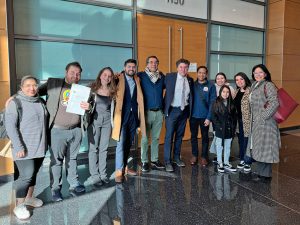The more you know about a subject the HARDER it becomes to teach it.
That may be counterintuitive, so let me explain.
When you know a subject very well –be it foreign policy or campaign strategy– you likely have a lot of information to draw from.
Given the opportunity, you rattle off all of the things that you think are important to know.
They could be a list of facts, historical examples, statistics, case studies…
To you, they all might be important.
But eventually your learners are hearing,
“Blah, blah, blah, blah…”
The reason is something we’ll call the curse of knowledge.
Tappers and Listeners
To illustrate this, let’s do an experiment.
Go find a friend and ask them to guess what song you are tapping.
That’s right, not singing or humming. To perform the song you are only allowed to tap on a table nearby.
Your friend needs to guess the name of the song only by hearing your taps.
(No facial gestures or clues allowed!)
Here is the song list:
- Happy birthday
- Mary Had a Little Lamb
- This Little Light of Mine
Go ahead, try it!
If you did, how did it go?
When psychologist Elizabeth Newmann performed this experiment she assigned students with 120 well-known songs and asked the tappers what percent they thought the guessers would guess correctly.
They said 50%.
Do you know how many actually guessed right?
Only 2.5%.
That’s almost nothing!
So how does this apply to training for social change?
A Better Approach to Training
You have a song that is playing in your head from your experience as an organizer, director or fundraiser.
Each fact you share is riddled with examples from your experience, reading, and research.
Your learners likely do not have the same melody playing in their head.
So when you play your song, all they hear are taps.
In order to avoid this, try the following:
- Instead of sharing a list of facts and examples, choose one that seems most relevant to the learners experience.
- Use a diversity of training methods, not just presenting.
- For each example, ask learners a question like, “What stands out to you?”
Need more ideas to switch up your training methods? Check out our post To Design Activities that Last Think of the SEA.
In order to transform ideas into action, it’s not enough to just have the tune playing in your own head.
You need to teach learners to tap along.
What do you think, how does the curse of knowledge impact your social change work?





